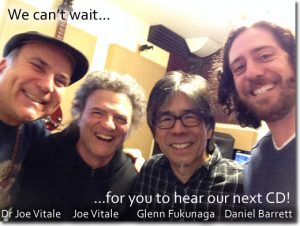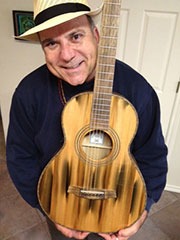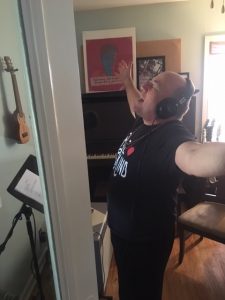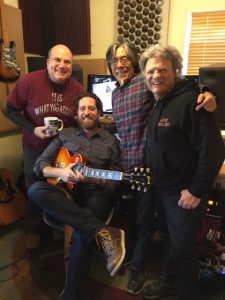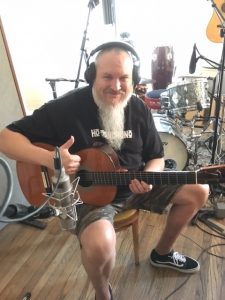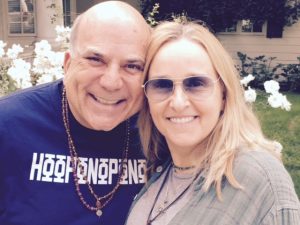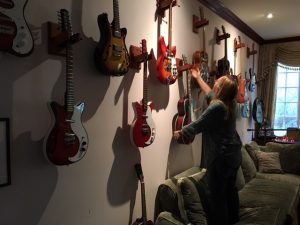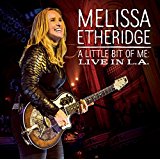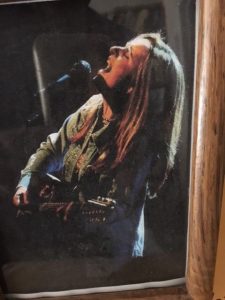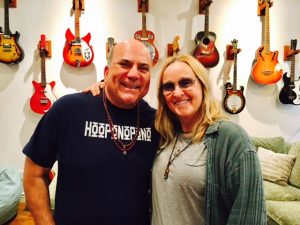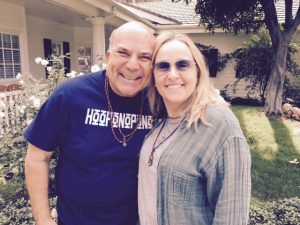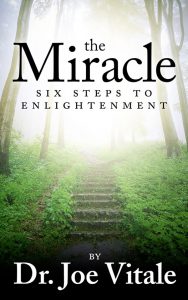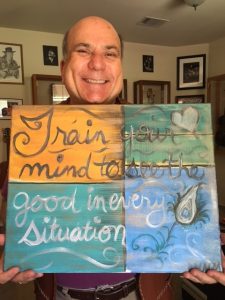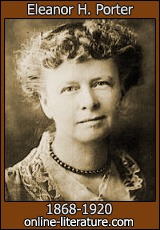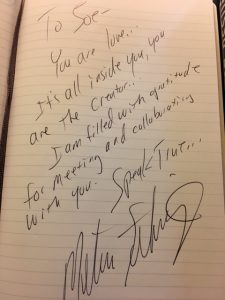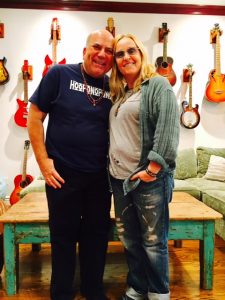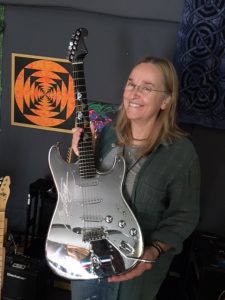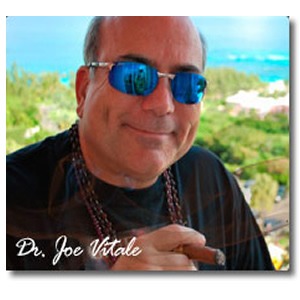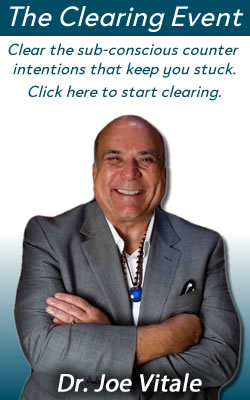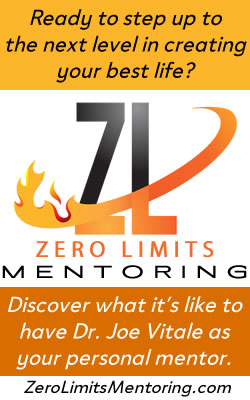Tag: love
Self-Help Songs
How can “self-help songs,” well, help your self?
My six singer-songwriter albums all contain original tunes of “song therapy.”
They often contain positive messages of motivation, transformation, and inspiration.
It’s my way of helping you through challenges and tough times with songs of encouragement.
In many ways, my songs are “coaches” in lyrical form.
My newest album, The Great Something – now on iTunes, CDBaby, Amazon, and more – contains the most advanced and memorable self-help songs of my career so far. But don’t take my word for it. Note –
Stephen Oliver said (used with his permission) “I just received my copy of your new CD, “The Great Something”. As soon as I got into my home office (I’m a freelance writer), I put it on the stereo. I’m listening to it as I write. Now I’m in a quandary. I can’t decide whether it’s incredible or ‘merely’ fantastic. Either way, I love it. I’ve already added it to my night time playlist, along with all your other CDs.”
And Jimbo Berkey said (used with his permission) “After listening to your newest album, “The Great Something,” I am convinced that it is the most powerful and compelling message that anyone who hasn’t begun this journey could ever encounter.” (Jimbo went on to buy 20 more copies of the CD to give out to people.)
Let me explain how you can use self-help songs like the ones on The Great Something in your life:
“The Hook”
When you are facing a situation where someone or something is about to “set you off,” take a breath. The self-help song “The Hook” (on my One More Day album) contains the message “Don’t Take the Hook!” It’s a reminder that you don’t have to take the bait. In general, whenever you get upset, it’s when you went unconscious. Something or someone flipped your internal switch and you got mad or sad. The song “Don’t Take the Hook” is your reminder that you have choice; you don’t have to get engaged or outraged. You can always walk away. You can even walk away singing, “Don’t take the hook!”
“The Glad Game”
But if you do take the hook and find yourself upset, you can always play The Glad Game to recover. I wrote this self-help song because of the famous book, and many movie adaptations of it, called Pollyanna. “The Glad Game” (on The Great Something album) is your reminder that you can find the good in any situation or person. You may have to really look. But it’s always there. Always. This upbeat swing-rock-dance song will show you the way.
“Look for the Light”
One way to find the good, or play The Glad Game, is to “Look For the Light.” This self-help song, also on The Great Something album, is a reminder that there is light (or good, or glad, or positive) in any and every situation. This song was born when someone asked me how to handle political fighting and opinion conflicts that split people. I spontaneously said, “Look for the light.” There are always people doing good things, and good causes you can find and support. But you may need to pause and look for it.
“Empowerment”
You’ll find yet another way to use lyrics as affirmations in my self-help song “Empowerment” on my album The Healing Song. This instrumental cried out for my voice, so I allowed inspiration to guide me in speaking hypnotic commands of inner strength. Listening to this track alone can strengthen your mental core, so you can have, do, or be, whatever you imagine and work toward. I listen to this song every time it shuffles up on my playlist. It’s powerful.
“There’ll Be Days”
After my private songwriting lesson with rock legend Melissa Etheridge, all of my music became more focused. The self-help song “There’ll Be Days” (also on my latest album, The Great Something) is my favorite song for conveying wisdom in a traditional singer-songwriter folk format. It’s a reminder that some days will be tough, and some will be tender, but you can get through them all if you smile and remember this song. I know it doesn’t sound humble at all, but I think this song is pure genius. At least I can’t stop listening to it. It’s hauntingly beautiful.
“The Great Something”
When you need reminded that you aren’t alone, and that the dark night of the soul will pass, you might listen to “The Great Something” (the title track on The Great Something album). This self-help song was directly inspired by my lesson with Melissa Etheridge. She advised me to write in the first person. I took her advice to heart and wrote the most personal, raw, and revealing song of my life so far. I listened to it earlier today to remind myself that “The Great Something” – what others might call Divine, Universe, Nature, Gaia or something else – is with you always.
“Some Thoughts”
Everybody has thoughts, but not everybody knows they are not their thoughts. The self-help song “Some Thoughts,” on my One More Day album, is an upbeat tune reminding you that some thoughts serve you and some thoughts suck. But you can play the jukebox in your mind and just select a different song/thought at any time.
“You Gotta”
The self-help song “You Gotta” (on my album titled Sun Will Rise) is a pep-talk in song. With saxophone, guitar and an upbeat drum (by the drummer with the same name as me), this one is designed to urge you to get up, get moving, and move toward your dreams. “You gotta dream, dare, grow and go” is an affirmation and command. After all, any dream you want to attract requires movement from you, as life is a co-creation.
“Everybody’s Going thru Something”
The most popular music video I ever had created is the one made to breathe life into the self-help song, “Everybody’s Going thru Something” (on my very first album, Strut!). I wrote this song to remind us that we all have dreams and we all have pains. If we can be more understanding, we can bring more peace to the world. (See the music video at the end of this post.)
“Remember”
The smokey-bluesy-jazzie self-help song “Remember” (on the album Reflection) is a hypnotic-poetic ballad revealing the creativity technique I used to make numerous albums. The technique is called The Remembering Process and Daniel Barrett, my producer, and I wrote a book explaining it called, naturally enough, The Remembering Process. With baritone saxophone and a smooth groove, this spoken word song offers you another way to enjoy creativity. For some reason I want to say this song is really hip.
If this intrigues you, please see All Healing Music, the portal for almost all of my healing music (many recorded with Guitar Monk Mathew Dixon) and self-help songs (all recorded with my band of legends: Daniel Barrett, drummer Joe Vitale, Glenn Fukunaga).
Remember, what you listen to also programs you.
Choose wisely.
Ao Akua,
PS – Audio samples of my singer-songwriter albums are here: http://www.cdbaby.com/Artist/JoeVitale1
PPS – You may also be interested in a blog post I wrote last year about Motivational Songs at https://www.mrfire.com/music/motivational-songs/
The Great Something
I’m going to share a hot off the press story with you here. Then we can look at how to apply the principles in it to your life.
Ready?
I just finished recording my sixth singer-songwriter album. It’s called The Great Something.
While the previous five albums all reveal a musician growing in confidence and ability, each one better than the last, this latest one broke all boundaries.
The songs are better than ever.
The singing is hands down the best ever.
The music is stellar, going from swing to ballad to rock to (as my drummer put it) “improvised symphony of genius.”
Why is this album so much better than all the others?
What happened?
I used everything I teach about self-help, goal-setting, and manifestation to create this album; from setting a clear intention to gathering my band of legends, to taking action on the ideas and opportunities that arose as I moved toward the recording date.
While all these elements are part of what make The Law of Attraction work in your favor, clearly the biggest turning point for me was attracting my private two-hour songwriting lesson with rock icon Melissa Etheridge.
I’ve already written four blog posts about my time with her. (See PS below for links to those “Attracting Melissa Etheridge” articles.) I won’t repeat myself (much) here, but I openly declare that my time with Melissa deeply influenced this entire album.
In fact, I’ve dedicated it to her.
Let me explain:
First, I used some of her music dynamics to create new songs.
The song “Melissa Said” is, as my producer called it, “The greatest thank you card of all time.” It’s an original song I wrote for Melissa, using some of the arrangements she shared with me about making music. My band got goose bumps listening to my homage to Melissa. It is stellar. It is three minutes of gratitude. (Wait till Melissa hears it!)
Second, the title track song was directly influenced by my time with Melissa.
While Melissa was too wise to tell me what to do, her feedback helped me learn lessons for myself. It was the Socratic method. Socrates didn’t give you the answer. He helped you think of it on your own. Being with Melissa helped me realize the title track song (and the album) needed to be called The Great Something, my phrase for God or the Divine. (It was originally going to be called The Miracle.) That insight redirected the entire album.
Third, and more importantly, Melissa urged me to write from the first person.
“The Great Something,” the title track song, is raw. It’s from my view of life, my hard times, and my discovery of The Great Something. The band was blown away with the power and depth of it. It is riveting. It is revealing. That is a direct result of taking to heart what Melissa told me about writing in the first person.
Fourth, when I was with Melissa, I shared the opening lines of a song that had come to me in my sleep.
Melissa liked what she heard. Because of that, I felt encouraged to complete the song. I did. It is the most hauntingly beautiful thing I’ve ever penned. It’s called “Hey You,” and it’s designed to heal any hurting heart. Guitar Monk Mathew Dixon added his sweet guitar on it and it is deliciously healing.
Fifth, Melissa taught me to feel my message when I sang.
As a result, my singing on a singer-songwriter ballad I wrote was, as my producer called it, “Sinatra-est.” It was probably the highest compliment he could give me. My voice compared even remotely to Frank Sinatra’s was enough to make me speechless. I just followed what Melissa taught me and felt the song as I sang it.
Obviously, I absorbed Melissa’s wisdom and vibe and infused it into this new album.
But we aren’t done with the album yet.
I’m hoping to have Grammy nominated saxophone great Mindi Abair add her happy sax to my “Glad Game” swing song.
I’m hoping Grammy nominated singer Ruthie Foster will add her soaring vocals to the spiritual I wrote called “Look for the Light.”
And I’m hoping Melissa Etheridge will add voice or guitar to any track.
I have big dreams for this new album. As Daniel Barrett, producer (and coauthor of the book, The Remembering Process) told me, “You can’t think average thoughts and expect extraordinary results.”
So, I’m thinking BIG.
This post isn’t about getting you to buy my new album. It isn’t completed yet, let alone ready for sale.
Instead, I’m sharing all of this with you to demonstrate how the Law of Attraction, magic, and miracles work.
Here’s a quick recap:
- I set an intention to create a new album that surpassed all my others.
- I visualized and felt the end-result, already done and a mega success.
- I cleared any limiting beliefs along the way, freeing me to be my best.
- I took action by writing songs, gathering my band, booking the studio.
- I seized opportunities, such as grabbing my music lesson with Melissa.
- I let go and went with the flow, while keeping my intention in mind.
I’m sure you can do this, too.
You have a dream, don’t you?
You could set an intention for it, gather allies, and start to move toward it, right?
Are there any real excuses or limitations for doing what you really want to do, if you really want to do it?
Isn’t today a good day to begin?
The Great Something says YES!
Ao Akua,
PS – Here are the links to my four blog posts about my songwriting lesson with rock icon Melissa Etheridge:
https://www.mrfire.com/law-of-attraction/attracting-melissa-etheridge-part-4/
https://www.mrfire.com/law-of-attraction/attracting-melissa-etheridge-part-3/
https://www.mrfire.com/law-of-attraction/attracting-melissa-etheridge-part-2/
https://www.mrfire.com/law-of-attraction/attracting-melissa-etheridge/
Note: In case you are curious, samples of my five singer-songwriter albums are here: http://www.cdbaby.com/Artist/JoeVitale1
Attracting Melissa Etheridge Part 4
I never intended to write a four part series about my private songwriting lesson with legendary singer-songwriter-guitarist Melissa Etheridge, but here we are.
I got so much out of my two hours with the rock icon last month that I’m still reflecting on it all.
In fact, friends claim that I mention Melissa in some way or other every fifteen minutes.
They’ve timed me. 🙂
One more session with her and I’ll be writing an entire book about all I’ve learned.
Anyway, in this episode I want to share what she taught me about singing, performing and becoming an overnight success.
Before we go there, I have to share a funny moment I had with her.
After Melissa showed me her book collection, guitar collection, and jigsaw puzzle she was working on, she walked me to a piano that her manager had given to her.
She played a few notes and asked me if I played.
“No,” I said. “I wanted a guitar when I was a kid. My father heard me and bought me an accordion. He didn’t want to hear rock, he wanted to hear polkas.”
“Parents!” Melissa said.
And from there we went into her home studio.
In my previous blog posts I shared what she taught me about writing songs. Her insights were revealing and inspiring. (See PS at end of this post for links.)
I told Melissa that one of the biggest fascinations for me was her singing.
I still remember her solo acoustic gig on Unplugged TV back in 1995.*
It shook me to the core.
Her explosive performance sent out ripples through time, and are still hitting my nerve endings today.
I want to sing like that, I thought. And I told Melissa so.
Of course, she asked me to sing for her.
And I (gulp) did.
It was actually easy to perform for her because she was entirely nonjudgmental.
She was patient, present, and eager.
But I was a nervous schoolboy compared to the powerhouse singing that Melissa does naturally.
So I asked her for any tips she could give me.
She told me about watching Ed Sullivan’s TV show and seeing house rockers, like Janice Joplin and Tom Jones.
“It was their joy in taking a song and belting it out,” Melissa explained. “Barbara Streisand, Johnny Mathis, Neil Diamond. I watched them perform. I always went with my feeling. I wanted to stand up and you know, SING.”
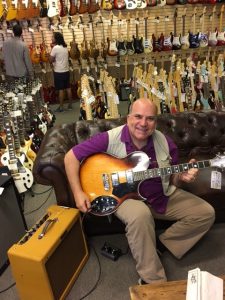
I went to Norm’s Rare Guitars in LA, suggested by Melissa, and got this cool late 70’s Gretsch Chet Atkins Super Axe with built-in phazer effects.
She went on to talk about where the power of a stirring performer comes from.
“Robert Plant’s singing like Janice Joplin,” Melissa said. “Janice Joplin’s singing like Memphis Minnie and Betsy Smith, and she’s singing like a black woman. All this rock and roll, and this popular music, comes from the slave era. It comes from this pain of I’m going to overcome this.”
“It comes from this pain of I’m going to overcome this.”
At this point Melissa pointed out that she heard a limiting belief in me.
She said that I thought I was too old to perform music and rock the world.
She reminded me that many people start entire new careers in their seventies. (I turn 63 today.)
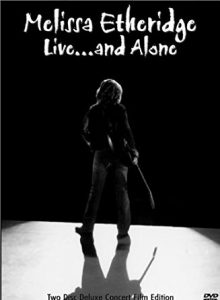
I told Melissa this is one of my favorite shows. She said she was afraid to do it alone but “felt the fear and did it anyway”
“There’s an infinite stream of energy that can become whatever we want,” she told me. “And it’s up to us and the story we tell inside.
“So you’ve gotta believe it first,” she stressed. “You’ve gotta believe it first.”
I started to understand that much of Melissa’s on stage power comes from a decision.
She consciously intends to be electrifying.
“You’re gonna draw up this power, and you’re going to project it,” she said. “And be willing to let that energy come through you. I have an agreement, and I made it a long time ago, with the Universe, that I would be a conduit.”
Melissa explained that we are all energy and we project a vibrational field.
“It’s possible to gather this energy and let it go through us,” she continued. “But to do that, we’ve gotta have a clean channel. If you ever hear of anybody touring that lost their voice, it’s because they’re eating late at night, they’re doing all this stuff that’s going to come up and burn their voice.”
She went on to focus on the songs.
“What material are you working with?” she asked. “Are you singing, tonight I feel so weak. Then act what you are getting across. Be present for what you’re singing. If you’re singing a slow song, everybody’s got a hunger, then think about it, live it, have it be alive in you when you’re singing it.”
Melissa then focused on my new song, the one we were working on together, and a line from it.
“If you are singing, I’ve got a message from the Great Something, and I found it through my struggles and strifes, then put that intention in you as you’re singing. Think, I want to tell this story, and I want you to be moved by it because I want you to know the joy I’m having.”
Melissa explained that she first started singing when she was ten years old. She was in choirs in churches. The teacher would put her in the back because “I had such a weird voice.”
Weird voice? Melissa??
“In sixth grade I wrote a song, a protest song,” she continued. “And I sang that in a talent show that became a variety show around my hometown. We played at old folks’ homes, schools and prisons. And so I slowly started singing for people.
“I got in a band when I was in junior high, like eighth grade,” she continued. “A professional band that had grown guys and me. And we would have gigs on the weekends, at the officer’s club and these places. And so I sang other people’s songs. And that really helped me.”
At this point Melissa is explaining her decades of singing experience, and singing snippets to me as she continues.
You have to imagine my delight in being in her studio and witnessing this.
“First I sang Tammy Wynette, Sometimes it’s hard to be a woman, and then Stand by your man. I learned to sing from your gut; to when you start with the energy, when you get up, I’m singing from here, and then I would sing the guy’s songs.
“I would sing Roberta Flack. I remember the first time, ever I saw your face is the song, but it was the first time that I sang a song in my band, where usually people are dancing and talking and they’re not paying any attention to the band, we’re just there for their pleasure, that actually people would stop, look at me and then applaud.
“And then I realized that oh, a song grows. I’m telling a story. And I would captivate, I would see people paying attention and want to take that energy and keep it. So I had years and years and years and years and more years of singing in front of people.
That’s often what it takes to succeed:
Years, and years, and years, and years and more years.
“When I finally got out to California, I played for five years in the bars, with drunk people,” she continued. “When I finally got my record deal at the end of the 80’s, I would have 100 people in the bar that came to hear me and liked my original songs.”
Melissa summed up her story by saying, “You just get on the path, you just do it, and that’s your intention, and then you let The Great Something bring you the stuff.”
Reread that.
“You just get on the path, you just do it, and that’s your intention, and then you let The Great Something bring you the stuff.” – Melissa Etheridge
I was in awe of all the lifetime experience it took Melissa to get noticed, get a deal, and explode on the scene.
As with virtually every “overnight success” (including my own, as an author), it actually didn’t happen overnight.
Once again, I could continue with all I learned from this loving legend of rock.
But right now I have a new album to record.
I’m dedicating my new album to Melissa.
There may even be a song on it called “Melissa Said,” which will be a tribute to her. I’m currently drafting it using, of course, everything I’ve learned from her. I am forever grateful to her, and want her to know it.
I’m obviously still on fire from sitting with Melissa, so somebody bring me some water!
Ao Akua,
PS – Here are links to my previous posts about my private lesson with Melissa Etheridge:
https://www.mrfire.com/law-of-attraction/attracting-melissa-etheridge-part-3/
https://www.mrfire.com/law-of-attraction/attracting-melissa-etheridge-part-2/
https://www.mrfire.com/law-of-attraction/attracting-melissa-etheridge/
Note: In case you are curious, samples of my five singer-songwriter albums are here:
http://www.cdbaby.com/Artist/JoeVitale1
* Brace yourself. Watch Melissa Etheridge on Unplugged TV 1995 here:
The LOA Glad Game
One of the best Law of Attraction books you could read today was first published in 1913.
Let me tell you about it…
Recently we watched the PBS television remake of the classic children’s book, Pollyanna.
I absolutely loved the new movie.
The acting, scenery, editing and story were virtually perfect.
There have been other movies of Pollyanna, going way back to 1920 with famous silent film star Mary Pickford. And of course Disney did their version in 1960 with Hayley Mills.
But this recent version is fresh and timely.
And I loved being reminded of the message in it.
At the core of Pollyanna’s sunny personality is “the glad game.”
In short, it’s the ability to find something to be glad about in any situation.
“There is something about everything that you can be glad about, if you keep hunting long enough to find it.” ― Eleanor H. Porter, Pollyanna
As Porter’s books reveal, this is at first something you have to train yourself to do. Even Pollyanna wasn’t born knowing it. Her father taught it to her.
It reminds me of the art I bought a few months ago:
In short, you can train your mind to see the good.
It’s what recent neuroscience is telling us.
You are not your brain; you are the operator of it.
You can teach your mind how to look for the “glad” in life.
And once you “get it,” looking for the glad in any situation becomes a fun challenge.
But the payoff is happiness.
And isn’t that what you want?
On my forthcoming new album, I plan to record a song called “Look for the Light.” It’s a reminder that there is light in everything.
But after seeing this remake of Pollyanna, I also wrote a song called “The Glad Game.”
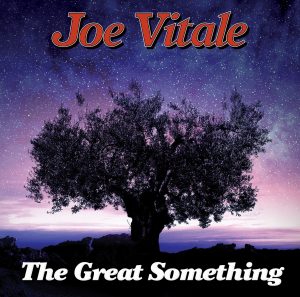
I’m dedicating my forthcoming sixth singer-songwriter album to Melissa Etheridge. It’ll have a “glad” song on it.
I’m using what I learned from my private lesson with rock icon Melissa Etheridge to write something memorable.
And all of this got me wondering where the glad game came from.
Did Eleanor Porter invent it?
“What men and women need is encouragement. Their natural resisting powers should be strengthened, not weakened…. Instead of always harping on a man’s faults, tell him of his virtues. Try to pull him out of his rut of bad habits. Hold up to him his better self, his REAL self that can dare and do and win out! … The influence of a beautiful, helpful, hopeful character is contagious, and may revolutionize a whole town…. People radiate what is in their minds and in their hearts. If a man feels kindly and obliging, his neighbors will feel that way, too, before long. But if he scolds and scowls and criticizes—his neighbors will return scowl for scowl, and add interest! … When you look for the bad, expecting it, you will get it. When you know you will find the good—you will get that…” – Eleanor H. Porter, Pollyanna
In my new book, The Miracle: Six Steps to Enlightenment, I mention a little book called Just Be Glad.
I went looking for it and found it.
It’s by Christian D. Larson, a popular New Thought author of such books as Your Forces and How to Use Them. He also penned the famous Optimist Creed, which I’ve reprinted in a book or two of my own.
Larson’s glad book came out in 1912.
Porter’s glad novel came out in 1913.
I can’t find any references to any “glad game” before 1913, when Pollyanna: The Glad Book was first published.
Certainly after the book became a bestseller, it triggered more books, a board game, a play, movies, and rumors have it there were glad game mastermind meetings.
Pollyanna became a huge bestseller in 1914, became a publishing phenomena, ignited a joyous, glad-hunting following around the world, and is still regarded as a classic of children’s literature today.
Maybe Larson’s little book gave Porter the idea for her novel. I can’t say. It’s not likely, though.
Porter was probably finishing her novel and sending it to the publisher in 1912, when Larson’s book arrived.
So I think Porter deserves full credit for creating the idea of The Glad Game.
But I was also curious why the glad game isn’t talked about much these days.
Considering how much stress is reported in the world, and how much “fake news” is triggering unsettling emotions in people, learning to play the glad game would be welcome relief.
It could even be healing.
It could even help us return to a clarity of mind where we could better see our choices.
In fact, the glad game could be a wonderful way to change your inner vibration to one that is higher, brighter, and even wiser.
As you know, you get what you radiate.
Change the dial inside, using the glad game, and you can attract happier results.
So, why don’t more of us play the game?
My guess is that critical, skeptical, wounded, or cautious people think being a “Pollyanna” is not being a realist.
Over the decades, the term “Pollyanna” has come to be an insult; used to tell someone they are foolish, not in touch with reality, and possibly even dangerous to themselves.
But being a Pollyanna is making a choice on how to see the world.
You can still see the challenges, and still see the good in them, and still act to change them.
Letting situations or other people steal your happiness is being a victim.
Choosing to see the good/glad in situations or other people is being empowered.
You have a choice, of course.
For me, life is an optical illusion.
You see what you unconsciously expect and believe.
Like Pollyanna, you can consciously choose to look for and find the good/the glad/the light.
It’s your choice.
“Be glad. Be good. Be brave.” – Eleanor H. Porter
Remember, if you see the good but just sit there, you aren’t co-creating your reality.
You want to see the good, see the actions you need to take next, and do them.
After all, when Pollyanna was injured by a car, she didn’t give up. (She did briefly, but she pulled out of it.)
Instead, she got treatment and she got better.
Eleanor Porter, the author of Pollyanna: The Glad Book, explained it this way:
“Pollyanna did not pretend that everything was sugar-coated goodness, instead Pollyanna was positively determined to find the good in every situation.”
Note the difference?
Just looking at the world with blind eyes to objective reality is not what the author meant; it was looking at the world and finding the good in it.
Eleanor Porter once told an interviewer –
“People have thought that Pollyanna chirped that she was ‘glad’ at everything … I have never believed that we ought to deny discomfort and pain and evil; I have merely thought that it is far better to ‘greet the unknown with a cheer.'”
I believe the 1913 book was an unrecognized Law of Attraction resource.
Maybe it’s time for all of us to read it again, or at least go see the movie.
I think you’ll find something glad in it. 🙂
Ao Akua,
Joe
PS – Learn about the recent PBS TV version of Pollyanna here:
https://www.amazon.com/Pollyanna-Sarah-Harding/dp/B01N67733P/
Attracting Melissa Etheridge Part #2
Back on September 1st I wrote about how I used the Law of Attraction and the Law of Right Action to attract legendary singer-songwriter-guitarist Melissa Etheridge.
At that time I hadn’t met her yet or had my songwriting lesson with her.
Well, now I have.
As I write this in Los Angeles, I had my session with her yesterday, at her home.
She met me outside her door, hugged me, gave me that Melissa million dollar smile, and said, “I didn’t know you were a fan.”
A “fan” is an understatement.
I’m a fan-atic.
I’ve been in awe of her performing and her music since around 1995.
To be standing with her was surreal.
As it turns out, Melissa is a fan of my work, as well as the work of the rest of the teachers from the movie The Secret. She’s personal friends with Tony Robbins. (Tony introduced ho’oponopono to her and her sweet spouse.)
She reads all the deep-end metaphysical books. She says she began around 2003 by picking up Ken Wilber’s The Theory of Everything, which is like learning how to swim by being dropped in the Atlantic ocean.
Her spirituality and understanding of manifestation has helped her awaken and achieve even greater levels of success in more recent years.
She told me that laying on her back, with cancer, and watching the movie The Secret, forced her to think about what she wanted in her life.
“If I am this powerful being who gave myself cancer and can create whatever I want, then I want healed, I want to make more music, and I want to win an Oscar.”
Of course, she went on and did all of that.
My time with Melissa was about songwriting, but she began it by asking about my life in music, my books, and then showing me her guitar collection.
Her favorite guitars are in the trailer that goes on the road with her. But she has a guitar room with them lining the walls like playable art.
And she has a studio with old and new and prototype guitars. (Ovation is releasing a ME electric in January). She also has more guitars in storage.
Of course, I related, understood, and told her of my own collection, which she says she wants to see one day.
We went in her home studio to focus on my actual lesson.
We each had a guitar. I had my songbook, where I jot ideas and snippets and songs. She said the songbook is sacred. (Later, I had her sign mine, making it even more priceless to me.)
From there she had me pick a song idea. She wanted to know the why for writing a song.
“What’s important to say in the song? Why do you want to write it? What’s the intention for it?”
She told me how she wrote some of her own songs, first thinking about why she wanted to write them.
She explained that for her song, Pulse, she wanted people to know that the person who went into a nightclub and shot dozens of people did so because he was in pain.
She also explained that for the Al Gore slide show about global warning, she wanted people to know that “I have to change,” not anyone else.
I found her to be a deep thinker, cutting to the core with her messages.
I told her about wanting to tell people how they could be happy now, and manifest their lives using the Law of Attraction, and more.
She nodded, accepting my reasons.
From there, for Melissa, it all begins with what I call a brain dump.
“Just write words,” she said. “Let it be okay whatever comes.”
She also advised to “fall in love with words.”
She uses a paperback thesaurus to look up other words, so she isn’t using too common or too cliche of words.
While I had been using Masterwriter, a popular software for songwriters, I found using a printed thesaurus slower but more enlightening.
The time spent looking up a word gave my mind time to think, and the alternate words were often surprising and triggered other thoughts.
We began with me wanting to write a song about Miracles, since my new book is titled The Miracle.
But within minutes the song became about The Great Something, a concept I write about in my book The Secret Prayer.
Instead of saying God, or Divine, or Universe, I refer to the super power behind all of life as “The Great Something.”
Melissa loved “The Great Something”‘ because it made you want to know more.
In a song, it would make you want to listen.
I got excited watching the song unfold with Melissa’s help.
Melissa often writes pages of words and phrases, knowing that later she will edit them.
“Editing is the fun part,” she told me.
She pointed to the back cover of my album, One More Day, to the line, “Self-help messages in 3 minutes or so.”
“That’s the challenge,” she said, smiling bright. “To condense pages of ideas into a three minute song.”
“That’s why I’m here,” I said. 🙂
Her songwriting template, more often than not, is to write a verse, then go right to the chorus, then to a versus, chorus, bridge, and chorus again.
“It’s stating the problem in the verse, and often a solution in the chorus,” she explained. “The next verse might spell out the problem more, and the chorus will again offer the upbeat solution.”
One of the biggest insights for me was the idea of writing in the first person.
Melissa says that first person songs are more personal and hit home with people.
Second person, or ‘you’ oriented songs, are one step removed from the listener and have less impact.
More often than not, she writes in the first person.
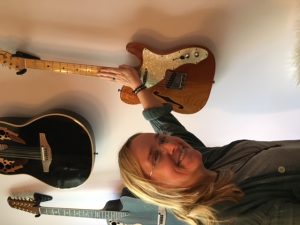
Melissa showing me her all-time favorite guitar, a Fender Telecaster. “If there’s a fire and I can only grab one guitar, it’s this one.”
I started to play with the idea of writing The Great Something song in the first person. I instantly felt more connected to the song, and felt more power in the message.
I also saw myself get more excited and inspired.
“Always write from inspiration,” she had told me earlier.
“Get to that place where you have tingles of excitement for whatever you are about to write,”she added. “Never write without the tingles.”
She doesn’t meditate but often walks in nature, looks at trees and flowers, reads some poetry, reviews songs from people she admires, from Bruce Springsteen to Neil Diamond, all to ignite her inspiration.
I told her I smoke cigars.
She didn’t seem to relate to that.
Of course, she lives in a state where cannabis is legal.
Later she asked me to sing for her.
Now try to imagine that.
I’m a star-struck beginner at singing, sitting in the home studio of a rock and roll legend who has the most soaring voice of all time, and she says, “Sing for me.”
That’s like having Elvis ask you to sing.
Well, I did.
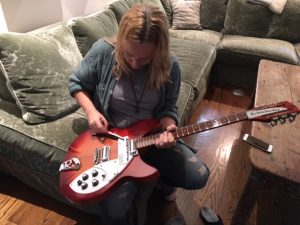
Melissa showing me her rare Rickenbacker “Cadillac”, an electric 12-string that can be turned into a 6-string with an awkward device
I played a snippet of my song One More Day, off my One More Day album, and a snippet of my song Today’s the Day, off my Strut album.
I also played a little instrumental, to give her a sense of what Guitar Monk Mathew Dixon and I create.
I was off key, out of step, and out of tune, but I did it anyway.
Melissa smiled big and said she bets the recorded versions with the band are stellar.
I then asked about singing advice.
Melissa took a breath and gave me a long, wise, hypnotic answer about watching the Ed Sullivan Show on TV and being influenced by Tom Jones, Janis Joplin, Robert Plant and others.
She noticed their joy in singing was what was so captivating.
She went on to say she wanted her music to be ballsy, not girlie.
She didn’t want to sing head voice, though she could.
She wanted something deeper and harder.
I related and told her I often felt more comfortable singing with a baritone guitar, which lowered my voice into my chest.
“That’s a good place for your voice,” she said. “It’s at home there.”
She also gave advice on performing.
“Never perform sitting down,” she said. “It cuts off your breathing.”
“And always eat, be hydrated, and get plenty of rest, so you can deliver your performance with full power.”
I’ll be processing my time with Melissa Etheridge for the rest of my life.
I found her open, loving, generous, spiritual, fearless, talented, present, friendly and wise.
She even invited me to speak on her next cruise ship concert. (!)
I was a fan (fanatic) before meeting her in person.
Today I’m in love.
Hey Melissa, I want to come over – again!
Ao Akua,
Joe
PS – Please note that whenever you have an expert coach you, your experience and expertise leap in incalculable measures. Melissa Etheridge heard a limiting belief come out of my mouth that I didn’t hear and I was the one who said it. We all need a coach. Consider Miracles Coaching.

